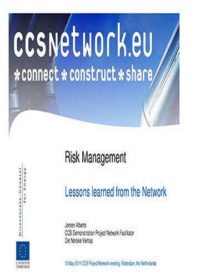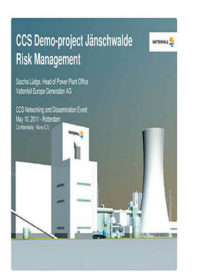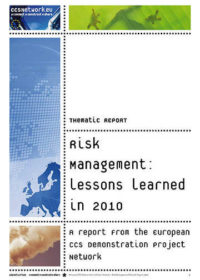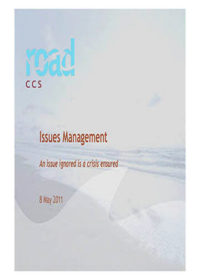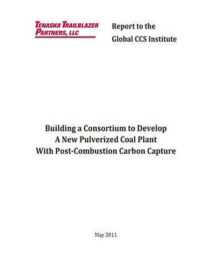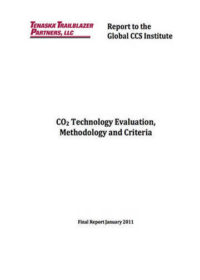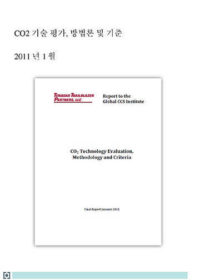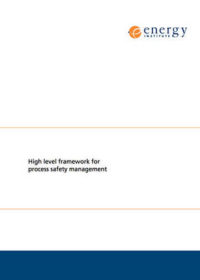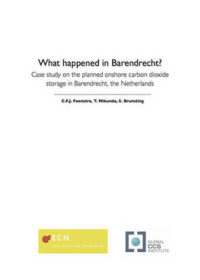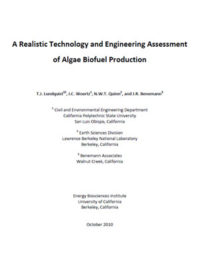Resources
Publications
Our publications, reports and research library hosts over 500 specialist reports and research papers on all topics associated with CCS.
View our Publication Library Disclaimer.
Filter by
Risk management: Lessons learned from the Network
10th May 2011
Topic(s): Carbon capture use and storage (CCUS), Engineering and project delivery
Disclaimer
The content within the Global CCS Institute Publications, Reports and Research Library is provided for information purposes only. We make every effort and take reasonable care to keep the content of this section up-to-date and error-free. However, we make no claim as to its accuracy, currency or reliability.
Content and material featured within this section of our website includes reports and research published by third parties. The content and material may include opinions and recommendations of third parties that do not reflect those held by the Global CCS Institute.
CCS Demo-Project Jänschwalde: risk management
10th May 2011
Topic(s): Carbon capture use and storage (CCUS), Engineering and project delivery
Disclaimer
The content within the Global CCS Institute Publications, Reports and Research Library is provided for information purposes only. We make every effort and take reasonable care to keep the content of this section up-to-date and error-free. However, we make no claim as to its accuracy, currency or reliability.
Content and material featured within this section of our website includes reports and research published by third parties. The content and material may include opinions and recommendations of third parties that do not reflect those held by the Global CCS Institute.
Thematic report: Risk management: Lessons learned in 2010
9th May 2011
Topic(s): Carbon capture use and storage (CCUS), Engineering and project delivery
Disclaimer
The content within the Global CCS Institute Publications, Reports and Research Library is provided for information purposes only. We make every effort and take reasonable care to keep the content of this section up-to-date and error-free. However, we make no claim as to its accuracy, currency or reliability.
Content and material featured within this section of our website includes reports and research published by third parties. The content and material may include opinions and recommendations of third parties that do not reflect those held by the Global CCS Institute.
Issues management: An issue ignored is a crisis ensured
8th May 2011
Topic(s): Carbon capture use and storage (CCUS), Engineering and project delivery
Disclaimer
The content within the Global CCS Institute Publications, Reports and Research Library is provided for information purposes only. We make every effort and take reasonable care to keep the content of this section up-to-date and error-free. However, we make no claim as to its accuracy, currency or reliability.
Content and material featured within this section of our website includes reports and research published by third parties. The content and material may include opinions and recommendations of third parties that do not reflect those held by the Global CCS Institute.
Building a consortium to develop a new pulverized coal plant with post-combustion carbon capture
1st May 2011
Topic(s): Carbon capture use and storage (CCUS), CO2 capture, Engineering and project delivery
The development of a complex project such as the Trailblazer project requires the selection, relationship management and coordination of a diverse consortium, including: developers, equity partners, engineering, procurement and construction contractors, operations and maintenance contractors, fuel suppliers, fuel transporters, water suppliers, power purchaser, carbon dioxide purchaser, Local, State and Federal Governments and lenders. The report discusses the factors considered in Tenaska’s approach to building and managing the consortium required to develop, construct and operate the project.
Disclaimer
The content within the Global CCS Institute Publications, Reports and Research Library is provided for information purposes only. We make every effort and take reasonable care to keep the content of this section up-to-date and error-free. However, we make no claim as to its accuracy, currency or reliability.
Content and material featured within this section of our website includes reports and research published by third parties. The content and material may include opinions and recommendations of third parties that do not reflect those held by the Global CCS Institute.
Deploying carbon capture and storage ‘safely’: The scope for member states of the EU to adopt more stringent CO2 stream-purity criteria under EU law
1st April 2011
Topic(s): Carbon capture use and storage (CCUS), Engineering and project delivery
In several European countries, recent initiatives to launch carbon capture and storage demonstration projects faced strong local opposition over perceived health, environmental, and property risks, putting policy makers under pressure to provide additional safety guarantees. One way to increase safety standards is to strengthen the criteria in Article 12 of Directive 2009/31/EC on the geological storage of CO2, which is based on the London Protocol and OSPAR Convention requirements on the purity of the captured CO2 stream. The German and the Dutch draft legislation implementing Directive 2009/31/EC both provide for the possibility to impose additional CO2 stream-purity requirements. The paper examines the scope for EU Member States to adopt stricter CO2 stream-purity criteria under EU law. Based on an analysis of the relevant case law of the European Court of Justice and the content of Directive 2009/31/EC, it concludes that the scope for EU Member States to adopt stricter CO2 stream-purity criteria under EU law is likely to be narrow. The room for non-EU parties to the London Protocol and OSPAR Convention to adopt such stricter requirements might likewise be limited.
Disclaimer
The content within the Global CCS Institute Publications, Reports and Research Library is provided for information purposes only. We make every effort and take reasonable care to keep the content of this section up-to-date and error-free. However, we make no claim as to its accuracy, currency or reliability.
Content and material featured within this section of our website includes reports and research published by third parties. The content and material may include opinions and recommendations of third parties that do not reflect those held by the Global CCS Institute.
CO2 technology evaluation, methodology and criteria
3rd January 2011
Topic(s): Carbon capture use and storage (CCUS), Engineering and project delivery
Disclaimer
The content within the Global CCS Institute Publications, Reports and Research Library is provided for information purposes only. We make every effort and take reasonable care to keep the content of this section up-to-date and error-free. However, we make no claim as to its accuracy, currency or reliability.
Content and material featured within this section of our website includes reports and research published by third parties. The content and material may include opinions and recommendations of third parties that do not reflect those held by the Global CCS Institute.
CO2 기술 평가, 방법론 및 기준
1st January 2011
Topic(s): Carbon capture use and storage (CCUS), Engineering and project delivery
Disclaimer
The content within the Global CCS Institute Publications, Reports and Research Library is provided for information purposes only. We make every effort and take reasonable care to keep the content of this section up-to-date and error-free. However, we make no claim as to its accuracy, currency or reliability.
Content and material featured within this section of our website includes reports and research published by third parties. The content and material may include opinions and recommendations of third parties that do not reflect those held by the Global CCS Institute.
High level framework for process safety management
1st December 2010
Topic(s): Engineering and project delivery, Health safety and environment
Process safety management (PSM) is a major issue for the energy industry, with many organisations looking to adopt a more holistic and systematic approach to assuring the integrity of their operations.
The Energy Institute (EI) Process Safety Committee (PSC) identified a benefit in promoting a common high-level framework for PSM across the energy industry sectors. EI High level framework for process safety management ('PSM Framework') provides a simple and systematic approach suitable for organisations large and small across the energy industry sectors, defining the key things organisations need to get right in order to assure the integrity of their operations incorporating technical, maintenance, operational, and human and organisational factors.
Disclaimer
The content within the Global CCS Institute Publications, Reports and Research Library is provided for information purposes only. We make every effort and take reasonable care to keep the content of this section up-to-date and error-free. However, we make no claim as to its accuracy, currency or reliability.
Content and material featured within this section of our website includes reports and research published by third parties. The content and material may include opinions and recommendations of third parties that do not reflect those held by the Global CCS Institute.
What happened in Barendrecht? Case study on the planned onshore carbon dioxide storage in Barendrecht, the Netherlands
3rd November 2010
Topic(s): Carbon capture use and storage (CCUS), Engineering and project delivery, Public engagement
This report is one of a series of case study reports undertaken by the CSIRO as part of an international comparison of communication and engagement practices surrounding carbon dioxide capture and storage (CCS) projects funded by the Global CCS Institute.
This case study describes events relating to the Barendrecht CCS project that took place between 2007 and 2010. The national and local context of the Barendrecht CCS project, technical aspects associated with the project, and associated stakeholder involvement are described. The report outlines defining moments that influenced relationships between stakeholders and their opinions of the project. It focuses on the characteristics of the communication that took place between stakeholders and with the community. Shortcomings in the communication are identified and presented as lessons for future CCS project developers.
Disclaimer
The content within the Global CCS Institute Publications, Reports and Research Library is provided for information purposes only. We make every effort and take reasonable care to keep the content of this section up-to-date and error-free. However, we make no claim as to its accuracy, currency or reliability.
Content and material featured within this section of our website includes reports and research published by third parties. The content and material may include opinions and recommendations of third parties that do not reflect those held by the Global CCS Institute.
A realistic technology and engineering assessment of algae biofuel production
1st October 2010
Topic(s): Biofuels / Bioenergy, Engineering and project delivery, Renewables
This Energy Biosciences Institute report assesses the economics of microalgae biofuels production through an analysis of five production scenarios. These scenarios, or cases, are based on technologies that currently exist or are expected to become available in the near-term, including raceway ponds for microalgae cultivation, bioflocculation for algae harvesting, and hexane for extraction of algae oil. Process flow diagrams, facility site layouts, and estimates for the capital and operations costs of each case were developed de novo. This report also reviews current and developing microalgae biofuel technologies for both oil and biogas production, provides an initial assessment of the US and California resource potential for microalgae biofuels, and recommends specific R&D efforts to advance the feasibility of large-scale algae biofuel production.
Disclaimer
The content within the Global CCS Institute Publications, Reports and Research Library is provided for information purposes only. We make every effort and take reasonable care to keep the content of this section up-to-date and error-free. However, we make no claim as to its accuracy, currency or reliability.
Content and material featured within this section of our website includes reports and research published by third parties. The content and material may include opinions and recommendations of third parties that do not reflect those held by the Global CCS Institute.
In Salah CO2 Storage JIP: site selection, management, field development plan and monitoring overview
1st September 2010
Topic(s): Carbon capture use and storage (CCUS), CO2 storage, Engineering and project delivery
This paper presents information on the Joint Industry Project (JIP) established to monitor CO2 storage at the In Salah geologic carbon sequestration (GCS) project in Algeria. Site selection was guided by the standard oil-industry Capital Value Process (CVP). After four years of injection and monitoring, a Quantified Risk Assessment (QRA) was performed to update the development plan. Monitoring included satellite facilitated measurements of surface deformation, as well as conventional oilfield technologies.
Disclaimer
The content within the Global CCS Institute Publications, Reports and Research Library is provided for information purposes only. We make every effort and take reasonable care to keep the content of this section up-to-date and error-free. However, we make no claim as to its accuracy, currency or reliability.
Content and material featured within this section of our website includes reports and research published by third parties. The content and material may include opinions and recommendations of third parties that do not reflect those held by the Global CCS Institute.
